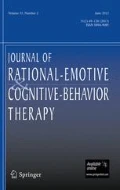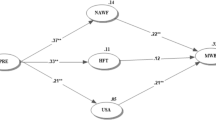Abstract
This paper reviews and discusses the results of five cross-cultural studies in Colombia, Costa Rica, El Salvador, Spain, and USA, using 2 (college students vs. their parents) × 2 (males vs. females) MANOVA match group designs with the Attitudes and Beliefs Inventory subscales as dependent variables, two multicultural studies investigating the relationship between some demographic variables (Pan American Health Organization's Index of Violence, and Acculturation) and people's Irrationality, and two multidisciplinary studies on the relationship between some medical conditions (skin diseases, and severity of symptoms during menopause) and Irrational Beliefs.
Similar content being viewed by others
REFERENCES
Alloy, I.B. &; Clements, C.M. (In press). Hopelessness theory of depression: Tests of the symptom component, Cognitive Therapy &; Research.
Barona, M. &; Lega, L. (1999). Problemas de acceptacion y de angustia situacional en pacientes con alteraciones de la piel: Un enfoque racionalemotivo conductual. In: Avances recientes en Psicologia Clinica y de la Salud. Granada, Spain: APICSA/FUENVECA.
Basurto de Garcia, S. &; Lega, L. (1998). Diferencias de generacion y sexo en el pensamiento irracional de estudiantes universitarios Colombianos y sus padres. In: Memoria/Proceedings World Congress of Behavioral &; Congitive Therapies. Acapulco, Mexico: WCBCT.
Bernard, M. E. &; Joyce, M. R. (1984). Rational emotive therapy with children and adolescents. New York: Wiley.
Blustein, H.T. (1979). El Salvador: A Country Story. Washington, D.C.: US Government Print Office.
Brannon, L. &; Feist, J. (1997). Health Psychology (3rd.ed.). Pacific Grove, CA: Brooks/Cole.
Brislin, R. (1973). Cross-cultural research methods. New York: Wiley.
Burgess, P. H. (1990). Toward resolution of conceptual issues in the assessment of belief systems in rational-emotive therapy. Journal of Congitive Psychotherapy: An International Quarterly, 4, 171–184.
Caballo, V., Gonzalez, S., &; Lega, L. (1998). Diferencias de generacion y sexo en el pensamiento irracional de universitarios Espanoles y sus padres. In: Memoria/Proceedings World Congress of Behavioral &; Cognitive Therapies. Acapulco, Mexico: WCBCT.
Caballo, V. E., Lega, L. I. &; González, S. (1996, November). Factor analysis of a back translation Spanish version of the Scale of Attitudes and Beliefs (SAB). Paper presented at the 30th Annual Convention of the Association for Advancement of Behavior Therapy, New York.
Campbell, I. M. (1985/1990). La psicología de la homosexualidad. In A. Ellis and M. E. Bernard (eds.), Aplicaciones clínicas de la terapia racional emotiva. Bilbao: Desclée de Brouwer.
Campbell, I. M., Lowe, B. &; Burgess, P. M. (1983). RET anatomy of neuroses. Unpublished manuscript, University of Melbourne.
Campbell, I. M., Lowe, B. &; Burgess, P. M. (1988). A reformulation of the rational emotive model of emotional disturbance: A heuristic for therapists. Unpublished manuscript, University of Melbourne.
Castillo, R.J. (1997). Culture &; Mental Illness. Pacific Grove, CA: Brooks/Cole.
Dryden, W. &; Ellis, A. (1988). Rational-emotive therapy. In K. S. Dobson (ed.), Handbook of cognitive-behavioral therapies. New York: Guilford.
Ellis, A. (1958). Rational psychotherapy. Journal of General Psychology, 59, 35–49.
Ellis, A. (1962). Reason and emotion in psychotherapy. New York: Stuart.
Ellis, A. (1973). Humanistic psychotherapy: The RET approach. New York: McGraw Hill.
Ellis, A. (1975). How to live with a neurotic (rev. ed). North Hollywood, CA: Wilkshire.
Ellis, A. (1976). RET abolishes most of the human ego. Psychotherapy: Theory, Research, and Practice, 13, 343–348.
Ellis, A. (1980). Discomfort anxiety: A new cognitive behavioral construct, Rational Living, 15, 25–30.
Ellis, A. (1984a). Expanding the ABC's of RET. In A. Freeman &; M. Mahoney (eds.), Cognition and psychotherapy. New York: Plenum Press.
Ellis, A. (1984b). The essence of RET. Journal of Rational-Emotive Therapy, 2, 19–25.
Ellis, A. (1985). Overcoming resistance: RET with difficult clients. New York: Springer.
Ellis, A. (1994). Reason and emotion in psychotherapy: Revised and updated. New York: Birch Lane.
Ellis, A. (2000). Personal communication.
Ellis, A. &; Bernard, M. (1983) (eds.). Rational emotive approaches to the problem of childhood. New York: Plenum.
Ellis, A. &; Bernard, M. (1985) (eds.). Clinical applications of rational emotive therapy. New York: Plenum.
Ellis, A. &; Dryden, W. (1990). The essential Albert Ellis. New York: Springer.
Ellis, A. &; Lega, L. (1993). Como aplicar algunas reglas basicas del metodo cientifico al cambio de ideas irracionales sobre uno mismo, otras personas y la vida en general, Psicologia Conductual, 1, 101–110.
Garcia, M. &; Lega, L.I. (1979). Development of a Cuban ethnic identity questionnaire. Hispanic Journal of Behavioral Sciences 1 247–281.
González, S., Caballo, V.E. &; Lega, L.I. (1996, November). Gender and generational differences in the Scale of Attitudes and beliefs (SAB) scores among college students and their parents living in Costa Rica and Spain. Paper presented at the 30th Annual Convention of the Association for Advancement of Behavior Therapy, New York.
Gonzalez, S., Lega, L., &; Caballo, V.E. (1998). Diferencias de generacion y sexo en el pensamiento irracional de estudiantes universitarios Costarricenses y sus padres. In: Memoria/Proceedings World Congress of Behavioral &; Cognitive Therapies. Acapulco, Mexico: WCBCT.
Grieger, R. &; Boyd, J. (1980). Rational-emotive therapy: A skills based approach. New York: Van Nostrand Reinhold.
Gutierrez de Pineda (1992). La Violencia en Columbia. Bogota, Colombia: Universidad Nacional.
Herr, K.G. (1996). Young &; Society. Thousand Oaks: Sage.
Hollingshead, A.B. &; Redlich, F.C. (1958). Social class &; mental illness. New York: Wiley.
Jones, R. (1968). A factored measure of Ellis' irrational belief systems with personality and maladjustment correlates. Doctoral dissertation, Texas Technical University.
Kent, G., Mohammed Al'Abadie (1996). Psychologic effects of vitiligo: A critical incident analysis Journal of the American Academy of Dermatology, 35, 895–98.
Lega, L. (1999). Neuvas Tendencias en la Terapia Racional Emotivo-Conductual (TREC). In: Avances recientes en Psicologia Clinica y de la Salud. Granada, Spain: APICSA/FUENVECA.
Lega, L. (1993). Diferencias transculturales en el uso de algunas tecnicas de terapia racional-emotiva: ejercicios para atacar la verg üenza. Psicologia Conductual, 1, 283–288.
Lega, L. (1991). La terapia racional emotiva: Una conversación con Albert Ellis. En V. E. Caballo (dir.), Manual de t´ecnicas de terapia y modificaci ´on de conducta. Madrid: Siglo XXI.
Lega, L. &; Barona, M. (1998). Terapia racional emotivo conductual, ansiedad y problemas psicosomaticos. In: Actas del I Simposio sobre Fobias y otros Problemas de Ansiedad. Granada, Spain: APICSA.
Lega, L. &; Barona, M. (in press). Ansiedad y piel, Revista Colombiana de Dermatologia.
Lega, L., Caballo, V. E., Basurto de Garcia, S., Gonzalez, S., Picerno, V., Lozano, J., and Romero, S. (1998). Diferencias transculturales en el pensamiento irracional (ABT, Burgess) de Colombianos, Espanoles, Costarricences, Salvadorenos y Estadounidenses. In: Memoria/Proceedings World Congress of Behavioral &; Cognitive Therapies. Acapulco, Mexico: WCBCT.
Lega, L., Caballo, V. E., &; Ellis, A. (1997). Teoria y practica de la terapia racional emotivo-conductual. Madrid, Spain: Siglo XXI.
Lega, L. &; Ellis, A. (1991). Rational emotive therapy: A case study. In R. Corsini (ed.), Five therapists and one client. Itasca, Illinois: F.E. Peacock.
Lega, L. &; Ellis, A. (1997). El proceso terapeutico en la TREC. In I. Caro (Ed.) Manual de Psicoterapias Cognitivas, Madrid (Spain): Paidos.
Leung, K. (1989). Cross-cultural differences: Individual-level vs. culture-level analysis, International Journal of Psychology, 24, 703–719.
Lopez-Vigil, J.I. (1992) Las Mil y una Historias del Radio Venceremos. San Salvador, El Salvador: Taller Grafico UCA.
Lotti T., Hautmann, G., Panconesi E. (1995). Neuropeptides and skin. Journal of the American Academy of Dermatology.
Lozano, J. &; Lega, L. (1998). Diferencias de generacion y sexo en el pensamiento irracional de universitarios Salvadorenos y sus padres. In: Memoria/ Proceedings World Congress of Behavioral &; Cognitive Therapies. Acapulco, Mexico: WCBCT.
Lylton, H. &; Ronney, D.M. (1991), Parents' Differential Socialization of Boys and Girls: A Meta-Analysis, Psychological Bulletin, 109(2), 267–296.
Matsumoto, D. R. (2000). Culture &; Psychology: People around the World (2nd. ed.). Stamford, CT: Wadsworth.
Myers, J.L. &; Well, A.D. (1991). Research Design &; Statistical Analysis. New York: Harper Collins.
Pan American Health Organization (1997). Index of violence in Latin American countries. New York: UN/PAHO.
Panconesi E., Hautmann G. (1992). Aspectos psicosomáticos de la dermatitis atópica, Monografίas de Dermatologίa, 5, 428–439.
Picerno, V. &; Lega, L. (1998). Gender &; generation differences in the irrational beliefs of USA college students and their parents. In: Memoria/ Proceedings World Congress of Behavioral &; Cognitive Therapies Acapulco, Mexico: WCBCT.
Primakoff, L. (1988). Solo Pioneers: Single-minded rationality, Journal of Rational-Emotive and Cognitive-Beehavior Therapy, 6(1&2), 66–71.
Rebolledo, A.M., Lega, L., &; Basurto de Garcia, S. (1999). Diferencias en niveles de ansiedad del ego y ansiedad situacional en pacientes Colombianas con sofocos severos vs. inexistentes durante la menopausia. In: Avances recientes en Psicologia Clinica y de la Salud. Granada, Spain: APICSA/FUENVECA.
Redfiled, R. (1936). Memorandum on the study of Acculturation. American Anthropologist, 38, 149–152.
Rogler, L. (1992). Acculturation and mental health status among Hispanics: Convergence and new directions for research, American Psychologist, 46(6), 585–597.
Romero, S., Lega, L., Ventura, A., Lozano, J., &; Picerno, V, (1999). Infuencias del proceso de aculturacion en el pensamiento irracional (ABT, Burgess) de Salvadorenos residentes en El Salvador y en Estados Unidos. In: Avances recientes en Psicologia Clinica y de la Salud. Granada, Spain: APICSA/FUENVECA.
Romero, S., Lozano, J. &; Lega, L. (1998). Differences in the irrational beliefs of Salvadorenos living in the USA and El Salvador. In: Memoria/Proceedings World Congress of Behavioral &; Cognitive Therapies. Acapulco, Mexico: WCBCT.
Russell, P.L. (1984). El Salvador in Crisis. Austin, TX: Colorado River.
Sodowsky, (1992). A study of acculturation differences among international people and suggestions for sensitivity to within-group differences. Journal of Counseling and Development, 71(1), 53–59.
Statistical Package for the Social Sciences (SPSS). Computerized full version.
Sutton-Simon, K. (1981). Assessing belief systems: Conceptions and strategies. In P. C. Kendall &; S. D. Hollon (eds.), Assessment strategies for cognitive behavioral ineterventions. New York: Academic Press.
Triandis, H.C. &; Berry, J.W. (1980). Handbook of Cross-Cultural Psychology: Methodology (v.2), Boston: Allyn &; Bacon.
White, A. (1973). El Salvador. London: Ernest Benn.
Author information
Authors and Affiliations
Rights and permissions
About this article
Cite this article
Lega, L.I., Ellis, A. Rational Emotive Behavior Therapy (REBT) in the New Millenium: A Cross-Cultural Approach. Journal of Rational-Emotive &; Cognitive-Behavior Therapy 19, 201–222 (2001). https://doi.org/10.1023/A:1012537814117
Issue Date:
DOI: https://doi.org/10.1023/A:1012537814117



